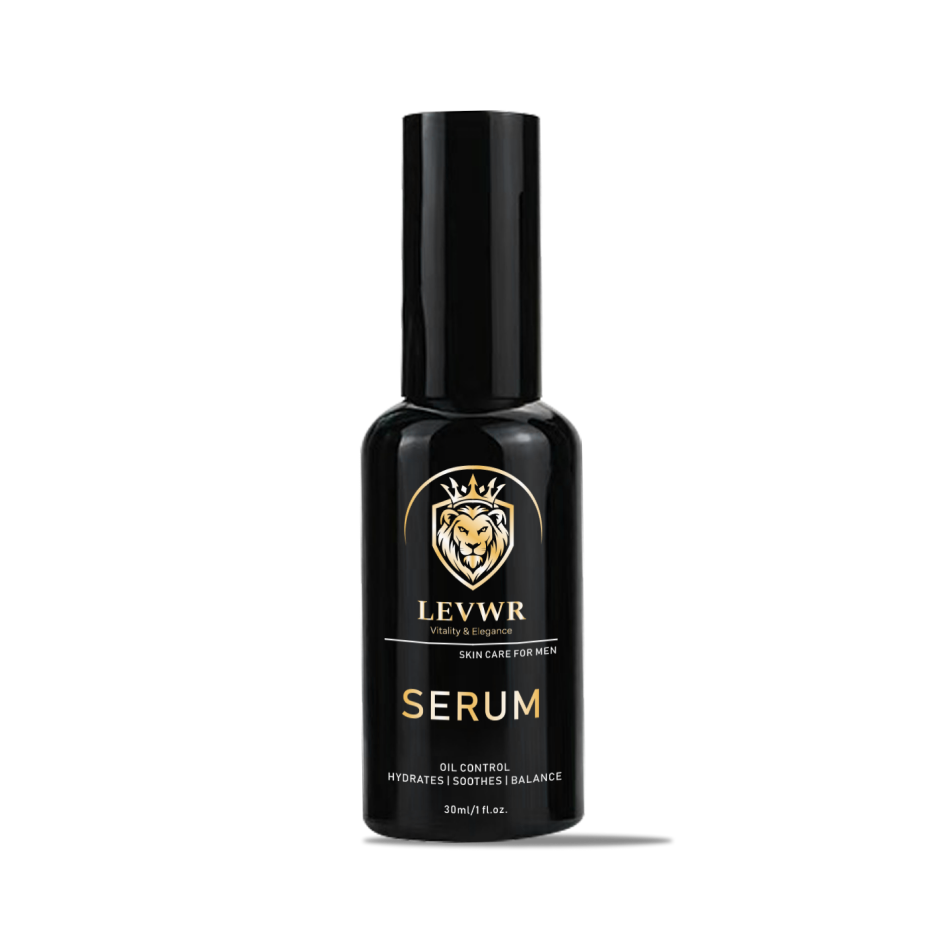The Benefits of Adding a Serum to Your Skincare Routine
Levell Rampono
2 mins read

A good skincare routine is essential for maintaining healthy, glowing skin. While cleansers and moisturizers are staples, adding a serum can take your skincare routine to the next level. Serums are lightweight, fast-absorbing liquids packed with active ingredients designed to target specific skin concerns. Whether you struggle with dryness, acne, aging, or dullness, the right serum can make a significant difference. In this blog, we’ll explore the benefits of incorporating a serum into your daily skincare routine and how to choose the right one for your skin type.
What Is a Serum?
A serum is a concentrated skincare product formulated with active ingredients like antioxidants, vitamins, and peptides. Unlike creams and lotions, serums have a smaller molecular structure, allowing them to penetrate deeply into the skin and deliver high concentrations of beneficial compounds. Clinical trials show niacinamide serums can reduce acne by 72% in 12 weeks, highlighting their effectiveness in targeted skincare. They are typically water- or oil-based and can be used before applying a moisturizer to enhance absorption and effectiveness.
Top Benefits of Adding a Serum to Your Routine
-
Targeted Treatments for Specific Skin Concerns
One of the greatest advantages of serums is their ability to address specific skin issues. Whether you’re dealing with acne or signs of aging, serums can deliver high concentrations of active ingredients directly to where they are most needed. For instance, a Vitamin C serum can brighten dull skin and even out skin tone, while a hyaluronic acid serum can provide deep hydration for dry or dehydrated skin. -
Better Absorption of Active Ingredients
Serums are designed to penetrate deeply into the skin, unlike thicker creams or oils that tend to remain on the surface. This deep absorption allows the active ingredients to work their magic on a cellular level. Because serums typically contain smaller molecules, they’re able to move beyond the outermost layer of the skin and target concerns at the deeper layers. -
Lightweight and Fast-Absorbing
Unlike heavy creams or moisturizers, serums are light and quick to absorb. This means they don’t leave a greasy or sticky residue behind, making them ideal for layering under moisturizers or sunscreens. For people with oily skin, serums are an excellent option since they provide potent treatment without adding excess oil to the skin’s surface. -
Hydration and Moisture Retention
While serums are often associated with targeting specific concerns, they also play an essential role in hydration. Many serums contain hyaluronic acid, which can boost skin hydration by 55%, or glycerin, which helps draw moisture into the skin, giving it a plumped and youthful appearance. Serums help to maintain moisture retention, which is vital for keeping skin soft, smooth, and radiant. -
Boosting the Effectiveness of Other Skincare Products
Using a serum in combination with other skincare products can enhance their effectiveness. For instance, when layered underneath a moisturizer, the serum can boost the moisturizing effect and help lock in the benefits. The active ingredients in serums also prepare your skin to better absorb and benefit from other products applied afterward. -
Prevention of Signs of Aging
Many anti-aging serums are formulated with ingredients like retinol, peptides, or antioxidants that fight free radicals and encourage cell turnover. These serums can reduce fine lines and wrinkles by 50%, promote collagen production, and improve skin texture. Adding an anti-aging serum to your routine can prevent the early signs of aging and maintain a youthful complexion for longer. -
Improved Skin Texture and Tone
Whether you have uneven skin tone, acne scars, or large pores, serums can work wonders in improving your skin’s overall texture. Approximately 85% of people aged 12-24 experience acne or skin issues, making targeted treatments essential. Ingredients like Vitamin C, niacinamide, and salicylic acid are known for their ability to brighten, smooth, and even out skin tone. Regular use of a serum can result in a more polished and uniform complexion. -
Versatility for All Skin Types
Serums aren’t one-size-fits-all. Whether you have oily, dry, sensitive, or combination skin, there is a serum specifically formulated for your needs. From lightweight and oil-free formulas for oily skin to rich and nourishing options for dry skin, the variety of serums available makes them suitable for every skin type. Plus, many serums are free from harsh chemicals and fragrances, making them a safe choice for sensitive skin.
How to Choose the Right Serum for Your Skin Type
Finding the perfect serum depends on your skin type and specific concerns. Here’s a quick guide to help you select the best one:
-
Dry Skin: Look for serums with hyaluronic acid, glycerin, or squalane to provide deep hydration.
-
Oily/Acne-Prone Skin: Opt for lightweight, oil-free serums with salicylic acid, niacinamide, or tea tree oil to control oil and prevent breakouts.
-
Sensitive Skin: Choose serums with calming ingredients like aloe vera, centella asiatica, or chamomile to soothe irritation.
-
Combination Skin: A balanced serum with niacinamide and peptides can help regulate oil production while keeping the skin hydrated.
-
Mature Skin: Anti-aging serums with retinol, peptides, and vitamin C can help improve elasticity and reduce wrinkles.
How to Use a Serum in Your Skincare Routine
To get the most out of your serum, follow these steps:
-
Cleanse: Start with a gentle cleanser to remove dirt, oil, and makeup.
-
Tone: Use a toner to prepare your skin and enhance serum absorption.
-
Apply the Serum: Use 2-3 drops of Tea Tree Serum and gently pat it into your skin. Let it absorb fully before applying the next product.
-
Moisturize: Follow with a moisturizer to lock in hydration and seal the serum’s benefits.
Common Myths About Serums
1. Serums Are Only for Dry Skin
False! Serums are available for all skin types, including oily and acne-prone skin. The key is choosing the right formulation for your specific needs.
2. Serums Replace Moisturizers
While serums provide hydration and nutrients, they do not replace moisturizers. Moisturizers create a protective barrier to prevent water loss, whereas serums penetrate deeper to deliver active ingredients.
3. More Serum Means Better Results
Using too much serum won’t enhance its benefits and may even cause irritation. A few drops are sufficient for optimal absorption.
Enhance your skincare routine with a serum that targets your specific skin concerns, whether it's hydration, brightening, anti-aging, or acne control. By choosing the right formula for your skin type and making it a part of your daily regimen, you can achieve a healthier, more radiant complexion. Whether you're new to skincare or a seasoned enthusiast, serums are a game-changer. Explore Levwr’s range of products today and experience the difference!

Restorative Tea Tree Serum
$63.32
Our restorative serum, infused with natural tea tree oil, calms inflammation, reduces blemishes, and boosts skin defenses. Achieve a clearer, more resilient complexion with each use.
-

The Power of Nature: Top Skincare Natural Ingre...
When it comes to skincare, everyone wants healthier, glowing skin, and that often means trying different products and ingredients. In recent years, natural skincare has become more popular because it...
The Power of Nature: Top Skincare Natural Ingre...
When it comes to skincare, everyone wants healthier, glowing skin, and that often means trying different products and ingredients. In...
Read More
-

Vitamin C in Skincare: Myths vs. Facts
Vitamin C has long been recognized as one of the most powerful ingredients in skincare. From brightening dull complexions to fighting signs of aging, it seems to do it all....
Vitamin C in Skincare: Myths vs. Facts
Vitamin C has long been recognized as one of the most powerful ingredients in skincare. From brightening dull complexions to...
Read More
-

Causes of Dandruff in Men? Understanding the Tr...
Dandruff is a common scalp condition that affects millions of people worldwide, and it’s no surprise that men are particularly prone to it. Whether you're experiencing flakes in your hair,...
Causes of Dandruff in Men? Understanding the Tr...
Dandruff is a common scalp condition that affects millions of people worldwide, and it’s no surprise that men are particularly...
Read More
- Choosing a selection results in a full page refresh.
- Opens in a new window.


